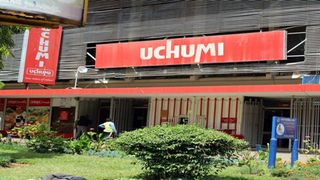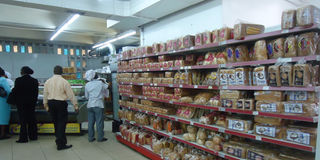
The Uchumi branch along Aga Khan Walk in Nairobi this year.
| Nation Media GroupPremium
Uchumi’s false start and fairy-tale run to profitability
What you need to know:
- The government started Uchumi Supermarket to cushion citizens from price fluctuations.
- The retailer was deemed a service retail chain and was offering affordable essentials to Kenyans.
- But surprisingly, it was not making money.
Uchumi Supermarket rose twice from the jaws of death and, for the third time in two decades, is once again facing its demise under the weight of a Sh4.2 billion debt.
Worse still, it has no assets to sell. At best, the 150 creditors have been asked to forfeit their Sh3.2 billion debt to Uchumi and agree to convert the balance (Sh1 billion) into equity to save the retailer yet again. Whichever way, they are not going to get their money soon.
On its path down to the gutter, Uchumi dragged taxpayers into the ugly mess, as governments of the day desperately tried to rescue the tottering retail chain. So far, the rescue attempts have only created a new crop of millionaires at the taxpayer’s expense.
Particularly, Uchumi has suffered three grand heists between 1976 and 2016, leaving the retailer for dead and its robbers smiling all the way to the bank.
It is a long story. A year after incorporation, Uchumi opened its doors with three branches. The shareholders hired Italian retail chain Standa SPA to manage it and train locals who would eventually take over its management.
Aside from starting the journey to affordable consumer goods for Kenyans, the government also got bragging rights for becoming the first investor to start a large retail chain capable of making a huge contribution to the economy.
Government agencies
Shareholding was split among government agencies. The Kenya National Trading Company, which was a supplier, and Kenya Wines Agency Limited became the majority shareholders, each with a 37.5 per cent stake.
The Industrial and Commercial Development Corporation Investment and the Industrial and Commercial Development Corporation (ICDC) were the other shareholders, with 15 per cent and 10 per cent stakes respectively. At the beginning, things were running smoothly and Kenyans were the biggest winners. Commodities like sugar and flour, by then under price control, would cost the same.
Uchumi was deemed a service retail chain and was offering affordable essentials to Kenyans. But surprisingly, it was not making money. Something had gone wrong with the business model. In the financial year ending June, 1980 Uchumi made a Sh6 million loss. This brought the total amount of losses in its five years of operation to Sh23 million.
Investigations revealed that Standa was only managing Uchumi on paper. Employees were engaged in rampant theft and it was overstaffed.
The names of the culprits involved in Uchumi heists were never made public, but that they nearly bankrupted Uchumi is on record. This was the first heist.
In 1980, shareholders and managers resolved that it was time to kick out Standa and let a local try to turn around Uchumi’s fortunes. This strategy worked wonders.
Suresh Shah took over as board chairman while former Treasury Permanent Secretary Charles Mbindyo took up the managing director’s office. These were the early days of the Moi regime when the looting culture was taking root. But Uchumi was lucky.

Inside the Uchumi branch along Aga Khan Walk in Nairobi in 2018.
Mr Shah was a revival expert and manager at ICDC seconded to Uchumi. Mr Mbindyo had just then been sacked from the Treasury after the ministry was suspected to have facilitated corrupt government officials in stashing graft proceeds into offshore bank accounts.
Somehow the two ran a tight ship and turned Uchumi around. In their first year at the helm, Uchumi cut its losses down to Sh250,000. In the following 10 years Uchumi became a success story, as it was raking in profits that were then only recorded by blue chip companies like Kenya Commercial Bank (KCB), Barclays and Jubilee Insurance.
Surprisingly, in September 1992 the government announced that Uchumi was among 200 non-strategic investments that it would be slowly moving away from.
Parastatal Investment Committee boss John Simba revealed that the government would dump its 40 per cent stake and allow the public to buy shares. This meant that Uchumi would trade at the Nairobi Stock Exchange, now known as the Nairobi Securities Exchange (NSE).
Uchumi would therefore become the first government-owned company to be privatised. When the share purchase was finally closed in November 1992, the retailer had sold 16 million shares, each going for Sh14.50.
Jimnah Mbaru
Then-NSE chairman Jimnah Mbaru hailed the decision. The government had failed to garner NSE support in listing another firm, East African Oxygen, earlier in 1992. The share prices, as it turned out, had been exaggerated.
But Uchumi had just made a Sh155.8 million in profits and had grown its annual turnover to Sh1.256 billion. The retailer also had cash reserves of Sh146 million and assets valued at Sh600 million, all thanks to prudent management.
Mr Shah had, at first, come under fire for sacking 70 out of the 225 workers when he took over in 1980. But, 12 years later, his recovery plan saw Uchumi grow, which in turn expanded its workforce to 800 men and women.
Suppliers were happy as their dues were being paid on time. Shoppers were happy. Jobs were created and essential goods were finally easily available, at least for Nairobi and Nakuru residents who had 12 branches between them.
The Sh200 million raised in the rights issue was partly used to kick-start Uchumi’s expansion plans in the hope that it could compete with other fast expanding chains.
With enough cash, nationwide expansion started in 1997, with various stores opened countrywide.





